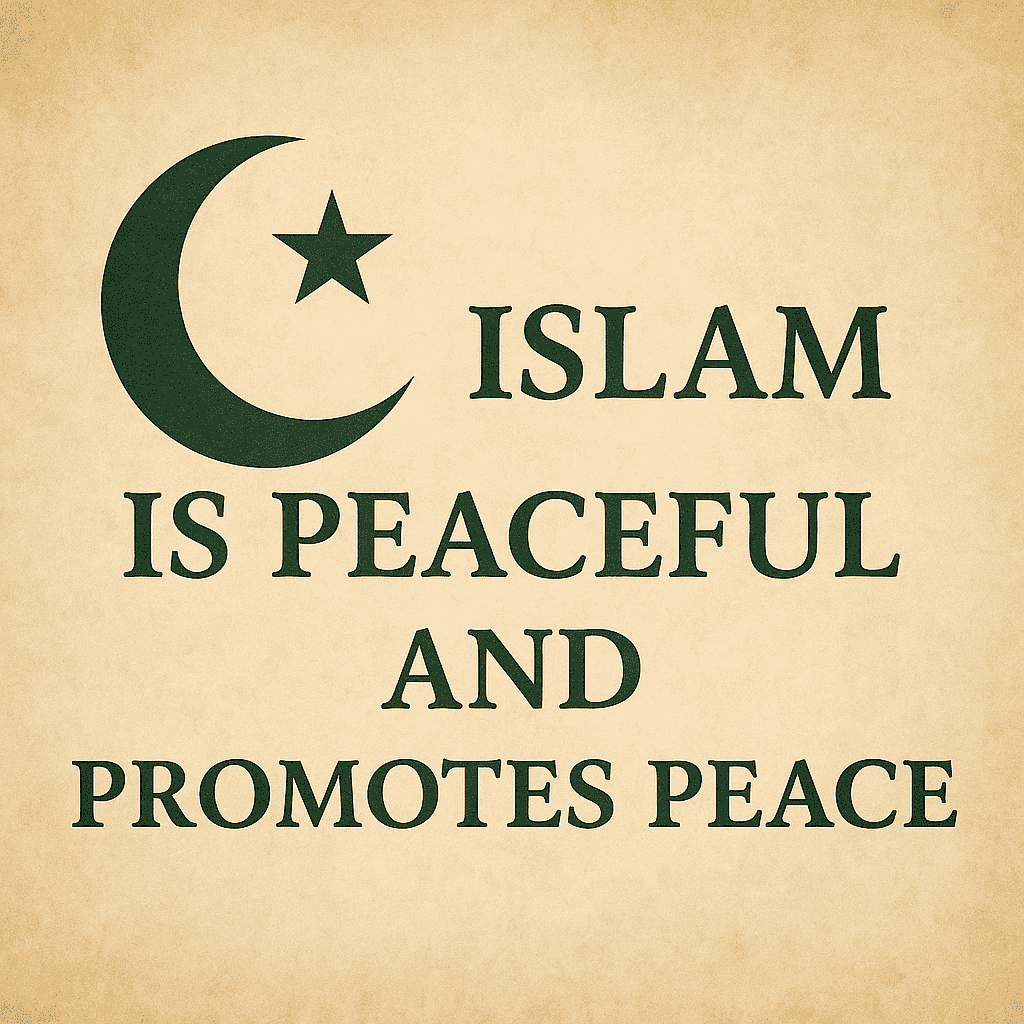
The Peace Ethos in Islam
Shuja Mushtaq
Islam, at its core, is a religion of peace—both in its literal meaning and its teachings. The very word Islam is derived from the Arabic root "s-l-m" which carries meanings of peace, safety, and submission. A Muslim, by definition, is one who submits to the will of Allah and seeks to live in harmony with creation. This peace is not just internal, but extends outward—towards family, society, the environment, and even towards one’s enemies. Islam does not promote blind submission to chaos, nor does it justify violence for selfish ends. Instead, it offers a well-structured framework of justice, compassion, forgiveness, and mutual respect.
One of the simplest yet most powerful examples of Islam’s peaceful nature is the greeting Muslims use daily: “As-Salamu Alaikum,” meaning “peace be upon you.” This is not a cultural habit—it is a divine instruction. The Prophet Muhammad ﷺ said: “You will not enter Paradise until you believe, and you will not believe until you love one another. Shall I not tell you something that if you do, you will love one another? Spread peace among yourselves” (Sahih Muslim, Hadith 54). This hadith directly links belief with love, and love with peace.
In the Quran, Allah emphasizes justice and forgiveness over retaliation. For example, He says: “And not equal are the good deed and the bad. Repel evil by that which is better; and thereupon the one whom between you and him is enmity [will become] as though he were a devoted friend” (Surah Fussilat, 41:34). This is not the rhetoric of a militant ideology—it is a call to higher moral conduct, even in the face of hostility. Islam’s peaceful approach is not weakness but wisdom.
Historically, the Prophet Muhammad ﷺ demonstrated this peace-driven philosophy during his lifetime. When he returned to Makkah after years of persecution, he had the power to seek revenge on those who had tortured, killed, and exiled his followers. But instead, he forgave them. He said to the Quraysh: “Go, you are free.” This act of unconditional pardon, known as Aman, was not a sign of political strategy alone—it was the embodiment of Islamic mercy and justice. This moment, narrated in numerous seerah books, including Ar-Raheeq Al-Makhtum, is a defining example of Islam’s peaceful essence in practice.
Another moment worth recalling is the Treaty of Hudaybiyyah. Even though the terms of the treaty seemed unfavorable to the Muslims at the time, the Prophet ﷺ accepted it to avoid war and promote long-term peace. Allah later referred to this treaty as a “clear victory” (Surah Al-Fath, 48:1). The lesson is profound—sometimes peace requires patience and restraint, not immediate triumph. This treaty eventually led to more people entering Islam due to the peaceful interaction and behavior of Muslims.
Islam also prohibits violence against innocent people. The Prophet ﷺ clearly said in his final sermon: “O people, just as you regard this month, this day, this city as sacred, so regard the life and property of every Muslim as a sacred trust” (Sahih Bukhari, Hadith 67). But this does not apply to Muslims alone. In another narration, the Prophet ﷺ warned: “Whoever kills a non-Muslim who has a treaty with the Muslims will not smell the fragrance of Paradise” (Sahih Bukhari, Hadith 3166). These teachings form a strong foundation against injustice and terrorism, regardless of the perpetrator or the victim.
Even in times of legitimate war, Islam placed strict boundaries. Destruction of trees, harming women, children, monks, and the elderly were prohibited. Caliph Abu Bakr رضي الله عنه gave these exact instructions to the Muslim army when sending them to battle. These principles are unmatched in comparison to many other historical military doctrines.
Peace in Islam is not limited to avoiding violence; it includes emotional and social peace. The Prophet ﷺ said: “A Muslim is the one from whose tongue and hands other Muslims are safe” (Sahih Bukhari, Hadith 10). This reflects a holistic idea of peace—emotional safety, physical security, and social harmony.
People often confuse certain punishments in Islamic law as signs of harshness. But Islamic justice is not blind brutality—it is always balanced by context, mercy, and immense opportunity for repentance. Allah says in the Quran: “Indeed, Allah commands justice and the doing of good, and giving to relatives, and forbids immorality, and bad conduct, and oppression. He admonishes you that perhaps you will be reminded” (Surah An-Nahl, 16:90). This verse is frequently recited at the end of Friday sermons, summarizing the mission of Islam in a single sentence—justice, kindness, and moral clarity.
If Islam was inherently violent, it could not have spread across continents through mostly peaceful means. In Indonesia, the largest Muslim-majority country today, Islam spread primarily through trade, character, and peaceful preaching—not conquest. Muslim scholars and merchants, known for their honesty and piety, inspired the locals. Their personal conduct reflected the Quranic command: “Invite to the way of your Lord with wisdom and good instruction, and argue with them in a way that is best” (Surah An-Nahl, 16:125).
In today’s world, where violence is often sensationalized and religion is blamed without nuance, it’s crucial to return to the original sources and life of the Prophet ﷺ. Islam, when understood and practiced as it was meant to be, stands as a guiding light of peace, justice, and mercy. The historical record, the Quranic message, and the Prophetic model all consistently promote peace—not just as an abstract goal, but as a lived reality.
